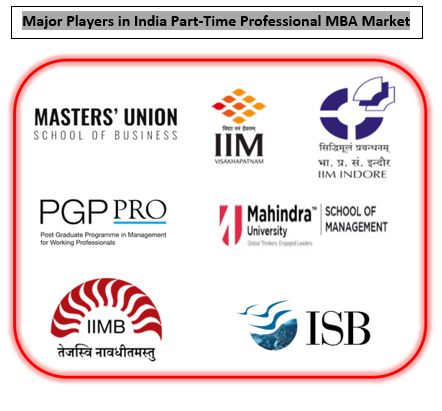India’s Part-Time MBA Arena: A Battle of Brilliance and Ambition
The demand for part-time professional MBA programs in India had been consistently rising due to the aspirations of working professionals to enhance their skills, advance in their careers, and increase their earning potential while continuing to work.
STORY OUTLINE
- Part-time MBA sector boasts diverse players including top business schools, universities, and specialized institutes, driving a dynamic competitive environment with unique program offerings.
- Seamlessly integrating advanced technology, institutions redefine education, with hybrid programs generating significant revenue, emphasizing technology’s impact.
- Renowned schools witness fierce competition, high applicant volume, while eligibility balances academics and experience, catering to professionals’ demands.
- Specialized tracks and industry ties distinguish institutions, reflected in high post-MBA role changes, spotlighting competitiveness and program relevance.
The competition landscape in the India Part-Time Professional MBA Market involves various factors that influence how business schools and institutions position themselves. Established business schools hold an advantage through their long-standing reputation and credibility. Program specializations play a crucial role, with schools offering unique and relevant concentrations attracting students seeking specific industry expertise.
1. India’s Part-Time MBA Arena Thrives with Diverse Players
 To learn more about this report download a Free Sample Report
To learn more about this report download a Free Sample Report
The market showcased a dynamic array of participants, encompassing prestigious business schools, established universities, and niche-focused specialized institutes. This rich diversity of institutions contributed to a competitive and vibrant ecosystem.
In their pursuit of attracting students, these diverse players harnessed their strengths to craft distinct program offerings. They introduced innovative features, specialized tracks, and cutting-edge curriculum designs tailored to cater to specific industry demands.
Recognizing the needs of working professionals, these institutions took on the challenge of providing flexible formats. They curated hybrid learning models, part-time scheduling options, and interactive online components to accommodate the diverse lifestyles and commitments of their prospective students.
IIM Bangalore’s EPGPM and Executive MBA by SOM, Mahindra University are offerings in 20-25 lakh price point.
2. Tech-Powered Learning

Visit this Link: – Request for custom report
Institutions seamlessly melded advanced technology into learning, enabling remote collaboration. This dynamic approach redefined education, offering convenience and innovation in tandem.
Modern learning investments empowered tech-savvy professionals. Interactive virtual classes, AI assessments, and immersive tools enhanced engagement, attracting digitally inclined learners.
Tech integration made institutions prime choices for tech enthusiasts. Virtual engagement, digital resources, and real-world application lured learners seeking cutting-edge education in the digital era.
Over ~80% of the revenue is generated via hybrid programs from three institutions. This financial dominance underscores hybrid learning’s transformative impact on the part-time Professional MBA market.
3. Demand vs. Supply: The Admissions Competition in MBA
Request free 30 minute’s analyst call
India’s part-time MBA admission involves strict criteria, with renowned schools witnessing thousands of applicants for limited spots. In 2020-2021, a top business school received ~3,000 applications for ~300 seats.
Eligibility balances academics and work experience, catering to professionals. ‘ISB’ saw a ~8% acceptance rate, reflecting the competitive demand for part-time MBA seats.
Differentiation thrives in specialized tracks and industry ties. A prominent institution recorded 90~% post-MBA role changes or promotions, showcasing competition’s reflection in industry relevance.
In conclusion, the India part-time Professional MBA market thrives on dynamic competition. Diverse players vie for prominence, powered by innovative program offerings and technological integration. As demand surges, admissions intensify, reflecting the market’s competitive nature. This ecosystem’s evolution signifies the symbiotic relationship between education and industry, fostering transformative growth.
